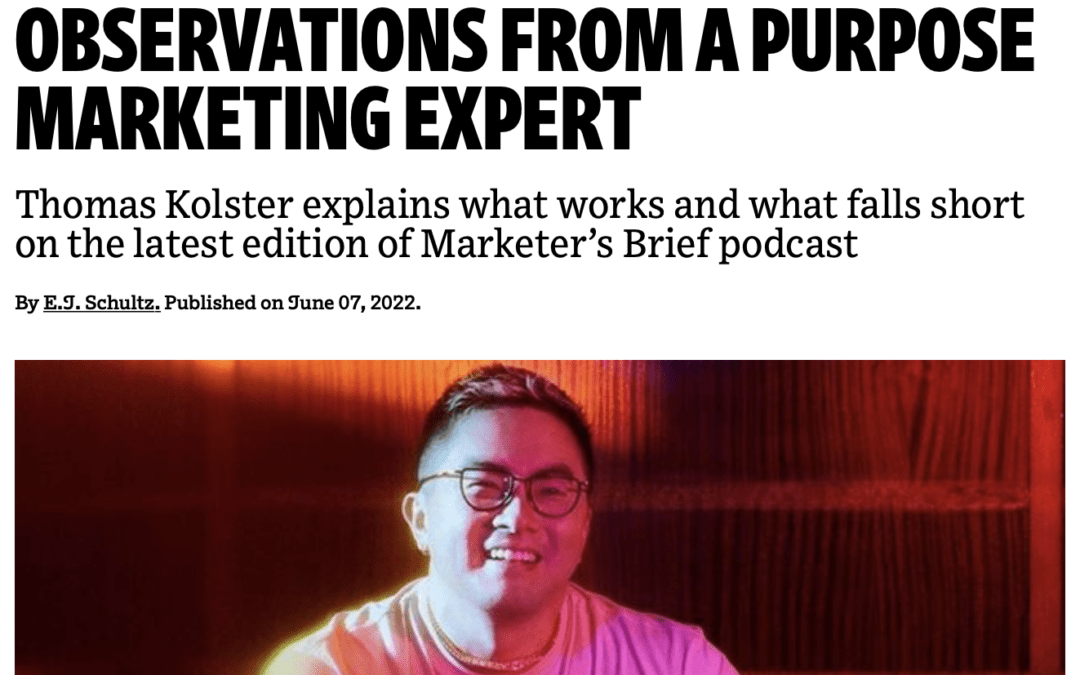In the second episode of the recent Ad Age podcast, we uncover the difference between commercial suicide and sincere support for the LGBTQ+ community. Check out the article and podcast (taken directly from Ad Age) below:
Purpose marketing expert Thomas Kolster does not praise brands easily. He is known to take a critical look at ways brands are attempting to feed into the purpose marketing frenzy. But when it comes to LGBTQ+ marketing, Kolster gives advertisers credit for playing a role in bringing LGBTQ+ issues to a national audience through mainstream marketing.
“We could thank a lot of advertising and brands for normalizing this to a large degree,” he said. “We should actually appreciate that.”
On this week’s episode, Kolster examines some brand-backed LGBTQ+ advocacy efforts, both recent and not-so-recent, as a way to explain what works and what falls short.
“One of the things I personally really, really love is when you have ads that are not preaching to the converted, that actually do reach out to the communities who… might not understand what this whole LGBTQ+ thing is about,” he said. “The most activist you can probably be is trying to reach out to those who don’t agree with you.”
Below, a quick look at some of the campaigns he dissects during the podcast.
Absolut: “Out & Open”
The vodka brand in May launched a new campaign highlighting the plight of LGBTQ+ bars, which it says have been closing at an exceeding rate. The campaign highlights the venues as valuable gathering spots, while seeking to help them with efforts including resources and a training partnership with the National LGBT Chamber of Commerce (NGLCC) that focuses on business succession. The campaign includes the audio telling of stories in which the bars have helped members of the community, including from actor Bowen Yang.
Kolster’s take: “Absolut has such a history and legacy of standing up [for] these issues…They have the permission to speak…Whatever they do they get it right because they are doing it for the right way … I don’t think people would ever look at Absolut and say they do it for the marketing, because we know Absolut for this stuff.”
Virgin Atlantic: “See the World Differently”
The airline in April described the campaign as a “colourful celebration of the diversity of the world around us.”
Kolster’s take: “Virgin does it in the spirit of what Virgin stands for in that way they do get it right. Does it really excite me? Does it bring something fresh and exciting to the table? I don’t think so.”
Campbell Soup: “Made for Real, Real Life”
This ad from the soup giant featuring a gay dad couple is nearly seven years old, but Kolster highlights it as LGBTQ+ marketing done right. “A lot of what we are doing in our industry is we are storytellers and we are trying to create emotional bonds and this is an [example] of advertising that does that brilliantly. I know there has been a lot of companies since then that are kind of in that same sphere, but I think it does show what adverting can do in terms of normalizing the LGBTQ+ community.”
Lego: “Everyone is Awesome”
The toymaker released its first-ever LGBTQ+ set in time for Pride month 2021. As Ad Age’s Creativity described it at the time, the “Everyone is Awesome” set “comes in rainbow colors and comprises 11 minifigures, each in a different hue, resting on a multi-colored platform inspired by the rainbow flag. The minifigures each have their own hairstyle, but are not specifically designed to be of either gender.” The designer is Lego VP for Design Matthew, who on the brand’s website shares his his experience growing up as a gay child in the 1980s and explains why such products are needed.
Kolster’s take: “What Lego is about is obviously play…being able to play with a toy that is designed for you, designed to celebrate the community, I think that makes a lot of difference.”

